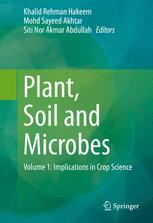

Most ebook files are in PDF format, so you can easily read them using various software such as Foxit Reader or directly on the Google Chrome browser.
Some ebook files are released by publishers in other formats such as .awz, .mobi, .epub, .fb2, etc. You may need to install specific software to read these formats on mobile/PC, such as Calibre.
Please read the tutorial at this link: https://ebookbell.com/faq
We offer FREE conversion to the popular formats you request; however, this may take some time. Therefore, right after payment, please email us, and we will try to provide the service as quickly as possible.
For some exceptional file formats or broken links (if any), please refrain from opening any disputes. Instead, email us first, and we will try to assist within a maximum of 6 hours.
EbookBell Team

4.8
44 reviewsThe interactions between the plant, soil and microbes are complex in nature. Events may be antagonistic, mutualistic or synergistic, depending upon the types of microorganisms and their association with the plant and soil in question. Multi-trophic tactics can therefore be employed to nourish plants in various habitats and growth conditions. Understanding the mechanisms of these interactions is thus highly desired in order to utilize the knowledge in an ecofriendly and sustainable way. This holistic approach to crop improvement may not only resolve the upcoming food security issues, but also make the environment greener by reducing the chemical inputs. Plant, soil and microbe, Volume 1: Implications in Crop Science, along with the forthcoming Volume 2: Mechanisms and Molecular Interactions, provide detailed accounts of the exquisite and delicate balance between the three critical components of agronomy. Specifically, these two titles focus on the basis of nutrient exchange between the microorganisms and the host plants, the mechanism of disease protection and the recent molecular details emerged from studying this multi-tropic interaction. Together they aim to provide a solid foundation for the students, teachers, and researchers interested in soil microbiology, plant pathology, ecology and agronomy.